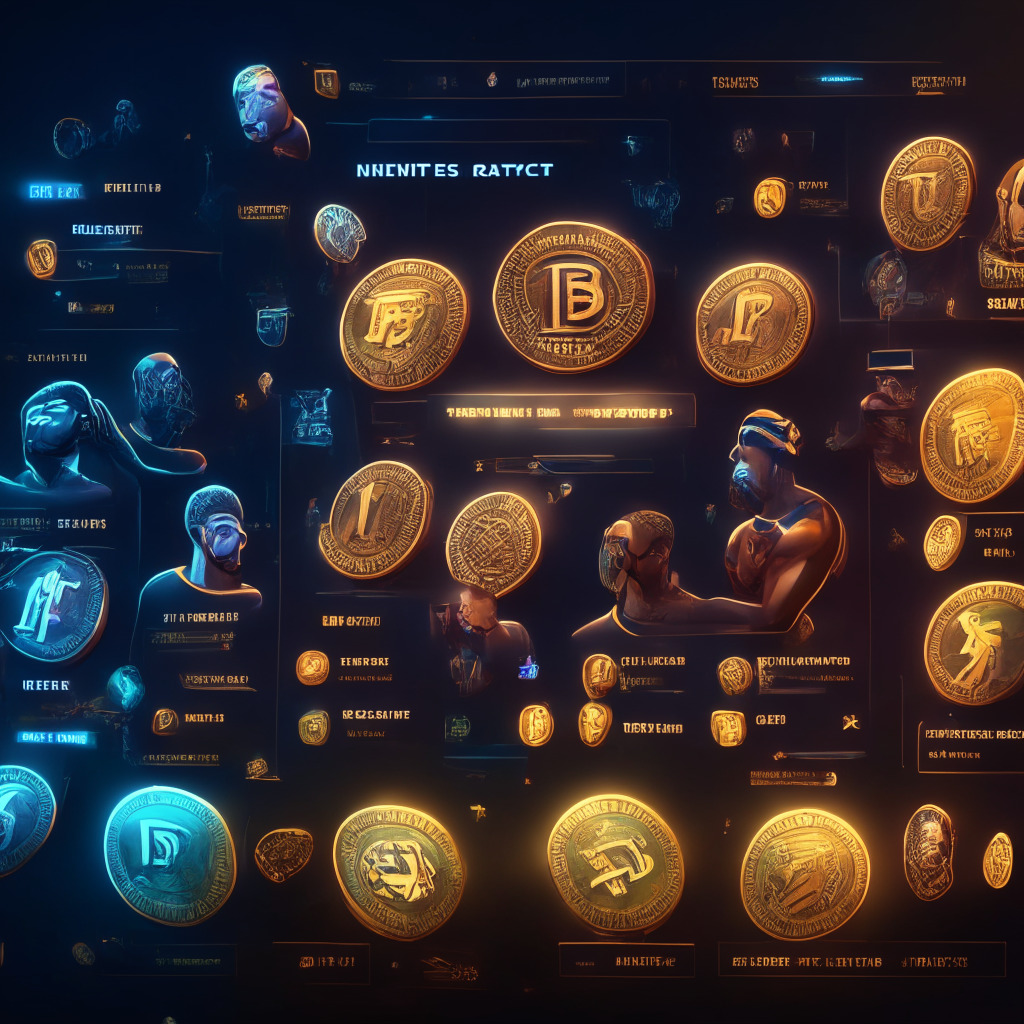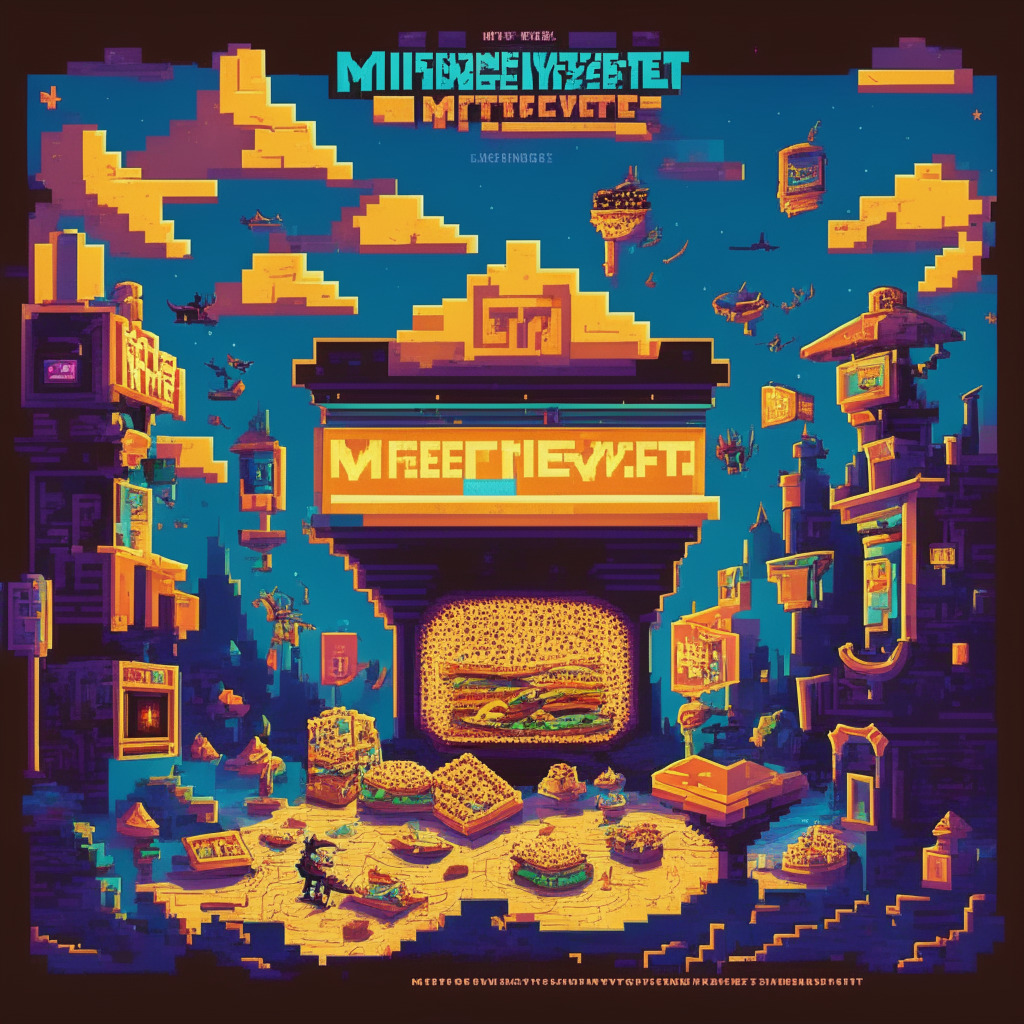Switzerland-based crypto bank, Seba, has received approval-in-principle from Hong Kong’s Securities and Futures Commission. This is an initial step towards gaining a full license for operations with cryptocurrency-related products and traditional securities. Seba’s move correlates with Hong Kong’s new regulatory measures aiming to attract companies into the region.
Search Results for: SEBA
Swiss SEBA Bank Navigates Hong Kong’s Evolving Crypto Regulatory Landscape
The Swiss-based SEBA Bank, known for its crypto friendliness, has made a significant stride towards offering crypto services in Hong Kong, securing approval-in-principle from the city’s Securities and Futures Commission. This move reflects SEBA’s strategic push to align with Hong Kong’s evolving crypto regulations and to strengthen its regulated presence across the Asia Pacific region.
Exploring the Metaverse Divide: East Booms while the West Wanes?
Sandbox co-founder Sebastien Borget emphasizes the booming metaverse market in Asia, despite seeming decline in the West. He is set to launch Lion City, a virtual neighborhood in the Sandbox metaverse, hinting potential geographical shift in metaverse utilization. This article also introduces the dynamic NFTs developed by Apple, possibly tipping the metaverse industry balance.
Fallen Crypto Giant FTX’s Uncharted Recovery: Clawing Back Celebrity Endorsements
“Financial advisers of the bankrupt cryptocurrency platform FTX are considering recovery of millions paid for celebrity endorsements. This involves navigating sponsorship fees under bankruptcy regulations. FTX’s documents reveal prepayment transfers to athletes and teams for advertising agreements, however, due to insufficient record-keeping, some transactions might go unnoticed.”
Harnessing AI to Mirror Bias: The Case of OpinionGPT and Its Limitations
Researchers at Humboldt-Universität zu Berlin have developed an AI model, ‘OpinionGPT’, trained on Reddit data to reflect bias from certain demographic groups. However, the model encounters criticism for its questionable accuracy in representing real-world biases, indicating a representation of Reddit stereotypes rather than wider demographic sentiment.
Hong Kong’s Digital Yuan Testing Phase II: A Leap to Future or a Threat to Privacy?
“Hong Kong is advancing on the second phase of technical testing for China’s digital yuan, focusing on the digital wallet’s top-up functionality via the Faster Payment System. Concomitantly, the city grapples with challenges balancing financial innovation and consumer protection in the fast-paced digital currency landscape.”
Surge in Crypto Space: Binance’s Expansion, HashKey Partnership, Patricia Token, and Favorable EOS White listing
“Binance Japan aims to triple its token offerings by listing 100 more. HashKey partners with imToken for digital asset self-management. Patricia, an Nigerian cryptocurrency exchange, launches ‘Patricia Token’, a debt management tool. SEBA Bank’s Hong Kong branch obtains approval-in-principle for securities and virtual asset dealings. EOS is whitelisted by the JVCEA for trading against Japanese yen. Cathedra Bitcoin improves its cryptocurrency mining production.”
Hong Kong and the Emerging Crypto Landscape: Opportunities and Obstacles Unveiled
SEBA Bank’s Hong Kong arm gained preliminary approval from the Hong Kong Securities and Futures Commission (SFC) to operate virtual asset services. However, the future of the crypto ban in mainland China remains uncertain. This development presents significant opportunities in Hong Kong’s digital asset regulatory framework and potential access to the Chinese market.
Dubai: A New Crypto Frontier – The Clash of Opportunities and Risks in Uncharted Waters
“Komainu, a partnership between Nomura, Ledger, and CoinShares, has gained a license from the Virtual Asset Regulatory Authority to offer full custody services to its Dubai-based clients. This marks a crucial step forward, considering Dubai’s nascent regulatory environment for cryptocurrencies.”
Surge in Stablecoin Use Amid Argentina’s Political Turmoil: A Deep Dive into Crypto’s Role in National Economy
Amidst Argentina’s economic crisis and hyperinflation, Argentinians are significantly increasing their purchase of stablecoins as a viable way to protect their savings. The trend, spurred by government restrictions on foreign currency buying and a depreciating peso, also sees an increasing number of transactions and salaries being paid in cryptocurrencies. The upsurge coincides with the rise of presidential candidate, Javier Milei, who holds a positive stance towards cryptocurrencies.
Sorare’s Strategic Shift: Linking Mainstream Currencies with NFTs for User Accessibility
Web3 fantasy-sports platform, Sorare, has introduced support for mainstream currencies to make its blockchain-based digital trading cards more accessible. Despite easing the use of the platform, cards remain as NFTs, and all transactions continue on the blockchain. This move balances improving access with promoting digital assets in mainstream tech.
Palm Foundation’s Move to Polygon Supernet: Innovations in NFT Infrastructure and the Path Ahead
Palm Foundation, with support from Polygon Labs and Consensys, is developing a Polygon Zero Knowledge Supernet to simplify onboarding and expand its NFT infrastructure. The plan includes addressing governance through Decentralized Autonomous Organizations and enhancing transaction speed while maintaining low gas fees. The initiative, targeting broader Web3 user-base, will complete its migration to a ZK Supernet by 2024.
Asian Games Shaping Digital Yuan Expansion: Opportunities, Challenges and City Rivalries
The city of Shaoxing is set to roll out an Asian Games-themed digital yuan giveaway to demonstrate China’s progress in central bank digital currency (CBDC). Supermarkets, hospitals, and transport providers in the city are embracing digital yuan payment functions, highlighting the adaptability and acceptance of this payment method. Additionally, the central People’s Bank of China is trying to make the digital yuan integral to metro payments.
Diving Into the Metaverse: Can McDonald’s Hong Kong’s Blockchain Venture Revolutionize Branding?
A highlight from the article: McDonald’s Hong Kong is stepping into the metaverse through ‘The Sandbox’, an Ethereum blockchain-based VR platform, to engage users and promote brand loyalty. Through this partnership, users can participate in a digital tour of the brand’s history and interact with virtual McDonald’s elements, earning tokens redeemable for virtual goods. This move signals a growing trend of leveraging blockchain technology for unique customer engagement strategies.
Navigating the Nostalgia Nugget: McDonald’s Plunge into the Blockchain Metaverse
“In an innovative blend of fast food and blockchain, McDonald’s announced the McNuggets Land in The Sandbox, a metaverse platform. This immersive experience offers treasure hunts and prizes, but faces skepticism about the tangible value of such marketing strategies in a sensory-limited digital realm.”
NFT Ticketing Upstart Get Protocol Secures $4.5 Million: Challenging the Giants or Too Ambitious?
Non-fungible token (NFT) ticketing company Get Protocol has secured $4.5 million in new funding, amid dwindling fundraising climate subsequent to the fall of the FTX exchange. The funds contributed by Flow Ventures and other notable Web3 companies aim to create an alternative to dominant entities such as Ticketmaster.
Unveiling The Future of Cryptocurrencies: Stability, Regulations, and Global Adoption of Digital Currencies
“The crypto market, reflected by Bitcoin’s and Ether’s stability, faces possible changes due to U.S. inflation figures, SEC’s scrutiny of Coinbase, the potential proliferation of retail central bank digital currencies (CBDCs), and fluctuating on-exchange liquidity at Huobi. This complex ecology requires caution, curiosity, and adaptability.”
The Candy Digital–Palm NFT Studio Merger: Fast-tracking Licensed NFT Projects or Pushing Cryptocurrencies into Dangerous Territory?
Digital collectibles giant, Candy Digital, and Web3 company, Palm NFT Studio, have unveiled a collaborative merger aimed to enhance digital interactions across varied fields such as sports and entertainment. The merging of these companies hopes to improve fan engagement through the creation of NFTs, providing an expanded platform for brands to connect with fans.
Swiss Bank Julius Baer Group Expands Crypto Services to Dubai: A Strategic Move for Global Dominance
“Swiss private banking group, Julius Baer, aims to broaden its crypto services in Dubai, after a successful Bitcoin launch in May 2020. The bank’s expansion stands as a testimony to digital asset adoption at a global scale. Julius Baer seeks a license modification to offer custodial services for digital assets, strengthening its commitment to innovative crypto solutions.”
Luxury Fashion Meets Blockchain: Unraveling the 9dcc x Stapleverse Collaboration & Beyond
In the 9dcc x Stapleverse collaboration, 250 limited-edition baseball caps exemplify connected fashion bridging physical and digital realms via embedded NFC chips and Ethereum ERC-6551 technology. This blockchain-powered approach redefines luxury, focusing on community, experience, and unparalleled craftsmanship while promoting active participation in challenges, storytelling, and memory creation.
NFT Autographs and Fashion: Revolutionary Collaboration or Futuristic Fad?
During Paris Fashion Week, Jeff Staple and gmoney introduced NFT-based autographs for limited edition 9dcc x Stapleverse baseball caps. This innovative crossover between Web3 technology and fashion highlights the possibilities of blockchain-based projects. However, a slow shift towards a crypto-enabled fashion world may require a decade, with regulatory politics being the main roadblock.
Unlocking the Potential of Web3: Disco’s Quest for User-Owned Data and Digital Identity Control
Disco, a metaverse company, aims to empower users to regain control of their data by moving it from isolated, company-owned platforms to digital wallets owned by individuals. By utilizing verifiable credentials, users can protect sensitive information while blockchain technology is essential in defining a user-owned identity.
Apple VisionPro: Crypto Enthusiasts Debate Impact on Metaverse and Adoption Prospects
The Apple VisionPro, a mixed reality headset, has garnered attention from the crypto community for its potential impact on the metaverse. Though it doesn’t compete directly with Meta’s QuestPro, the device facilitates broader discovery and pushes metaverse boundaries, driving immersion and technological innovation.
Aave Secures $15M for NFT-Powered Decentralized Social Media: Lens vs. Traditional Platforms
Aave secures $15 million to develop Lens, an NFT-powered protocol for decentralized social media platforms, enabling users to tokenize social data and transfer it between platforms. Built on Ethereum scaling solution Polygon, Lens aims to consolidate users’ online presence and promote growth across networks.
Apple’s Metaverse Entry: Mass Adoption Boon or Decentralization Threat?
Apple’s Vision Pro headset announcement excites Web3 and open metaverse proponents, who believe better hardware is essential for an interoperable virtual world based on blockchain technology. However, concerns arise over Apple’s potential control over decentralization and guidelines within the metaverse.
Digital Yuan Integration in Asian Games: Progress or Global Power Play?
The digital yuan is becoming a predominant form of payment in China, with venue cities for the Asian Games incorporating central bank digital currency (CBDC) transport solutions. The updated digital yuan app’s “ride code” function lets users scan their devices on the Hangzhou Metro, allowing for fast and efficient public transportation payments.
DAI’s Shifting Collateral Mix: Decreased USDC Backing and Future Decentralization Prospects
MakerDAO’s DAI stablecoin has reduced its USDC backing from 50% to 23.6%, increasing diversification in its backing assets. As dependency on USDC decreases, DAI’s backing now includes more significant real-world assets, such as U.S. government bonds and stablecoins like GUSD and USDP.
NFTs: Unique Value in a Volatile Market – Pros, Cons, and the Road Ahead
In a recent interview, entrepreneur and crypto enthusiast Gary Vaynerchuk discussed the current state of the NFT market, comparing it to collectible sports cards and stuffed animals. Despite concerns like market oversaturation and regulatory uncertainty, Vaynerchuk remains optimistic about the future of NFTs, as the technology’s application extends to art, sports, and entertainment industries.
Blockchain, NFTs, and Music: Revolutionizing the Industry or a Passing Fad?
The blockchain-powered Web3 music NFT marketplaces, such as AnotherBlock and Royal, enable fans to acquire tokenized music rights and earn royalties alongside artists. With high-profile backing and increasing interest, this intersection of blockchain and music presents a new frontier for creators, fans, and the industry.
Digital Assets as Legitimate Property: A New Era for the Metaverse and Digital Natives
The growing number of digital natives investing in cryptocurrencies and NFTs has led to the proposition of recognizing digital assets as legitimate property. Co-founder of The Sandbox, Sebastien Borget, believes governments should treat the digital economy as a “real economy” and acknowledge the value digital natives attribute to these assets while addressing concerns such as volatility, regulation, and environmental impact.
Metaverse: A Fading Fad or Unstoppable Future? Debating Views of Industry Leaders
Epic Games CEO Tim Sweeney humorously defended the Metaverse’s future, countering an article claiming its decline. Noting the vast active user base across platforms and major corporations’ development and investment within the Metaverse, Sweeney’s optimism stands firm.
Exploring SportVerse: Revolutionizing Crypto Gaming in the World of Sports
SportVerse, a play-to-earn sports gaming platform, offers users an immersive experience beyond competition, covering training, social interaction, and supplementary goods and services. Built on Ethereum and Binance networks, it enables users to earn tokens and engage in various sports-related activities while developing their virtual skills.






























